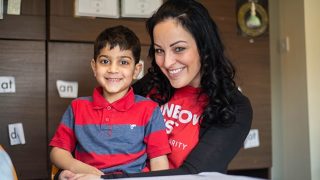Explaining to a child that their sibling has died can be daunting for parents and carers. Approaches to this can vary depending on age, and circumstances surrounding the sibling’s death, but here are some points to remember when talking to your child about a death.
It is important to highlight that although our advice is based on the experience of our Family Support Workers, you know your child best and are therefore best equipped to make decisions to help them through their grief.
This article should be read as suggested advice, should you need it, not a list of rules or instructions to follow exactly. Every family and every individual grieve differently, so don’t be discouraged if your experiences do not align with others.
Supporting Bereaved Siblings
Explaining death to a sibling
Pre-bereavement
This is not possible in every circumstance, but beginning conversations surrounding death with your child can help them begin to understand death and what is likely to come. Start by talking to your child about what they already know. If they’ve experienced a loss before, this could be a grandparent or pet, then referring to these and the feelings surrounding it can help the child connect with emotions around grief. By having this conversation early, you are allowing your child to absorb the language and try to make sense of the situation.
The charity Winston’s Wish provides some great suggestions for books about death for children, you can read it here.
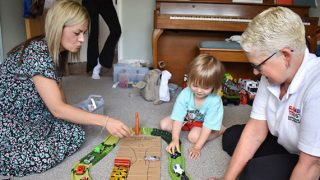
What are the facts?
As hard as it may be, the best thing you can do is be honest. Children require clear and digestible information, so try and be as succinct and age appropriate as possible. Try to avoid ambiguous language such as ‘pass away’ or ‘gone to sleep’ as this can be confusing to children. Using clear language such as ‘death’ and ‘dying’ is important to avoid any confusion and can help your child connect to feelings of loss. Try and talk about the practicalities of the loss and what it will mean, for example how their life or routines might be affected.

Create a space for questions
It is likely that your child may have many questions surrounding their sibling’s death or illness. Answer questions as clearly as possible, and as you feel appropriate. Children often have a way of asking very direct, fear-based questions, so creating a space where they can explore this is important. Also encourage them that they can ask you questions, or talk about it more, at any point and that the conversation doesn’t have to end there.
Be mindful of where you have this conversation. A neutral environment is a good option, for example a walk or to an external space. The space you have this conversation in will have an impact and you want their home/bedroom to remain a safe space away from this topic.

Comfort and reassurance
Though your child might not initially seek comfort, reassuring them that you love them and being on hand for physical comfort and support is important. Show compassion and understanding that this is just really sad and difficult. Keep an eye on your child and check in regularly – break boundaries if needed. Some children may seek this more than others, but making sure your child knows you are there for them can be hugely beneficial.

Should I show my emotion to my child?
How you display your feelings and emotions to your child can have a big impact on their own expression. Don't be afraid to show your emotions to them; your behaviour is impactful and can shape the way they might process future losses. It’s okay to cry and it’s important to let them know that feelings are okay. Being sad or angry is a normal reaction, and being able to vocalise this can help your child know it’s okay to talk about their feelings. Reassure them that they can come to you if they are feeling sad. But also emphasise that they have done nothing wrong – it is not them that is making you sad. Using clear language to explain your own feelings may help your child articulate theirs.
Should my child attend the funeral?
This can be a difficult decision for parents and carers. Funerals can seem like an unsuitable situation for a child and ultimately, it is up to you, knowing your own child’s needs and personality. It is important to think carefully about this and weigh up the potential pros and cons of your child attending. There can be positive results of children attending funerals of their siblings, especially if they are given the element of choice. Talking with them about what a funeral is, what it involves, and what it might look like based on your family’s culture and beliefs can help inform the child of their choice
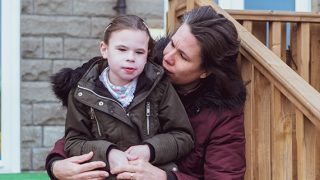
A funeral can be a big part of the grieving process by seeing other people upset about the loss. This is important for the child to begin to express these emotions themselves. Some children may find it helpful to be part of the funeral planning. They can help choosing some music, or a poem to read - this can make them feel more involved and valued at a difficult time. If you/they do decide to attend the funeral, having some sort of escape or exit plan, if needed, can be helpful. For example, agreeing an ‘exit’ word with your child that they can say if they need to take some time for themselves can help reassure them that they can take a break if they need it. If needs be, plan with the child for a designated trusted person (could be a friend or family member) to help facilitate support by accompanying the child should they need to exit by perhaps sitting with them.
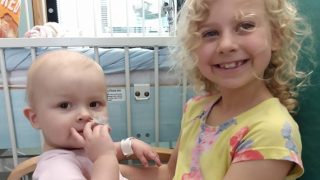
Responses to grief
Every child will react differently to grief, and it is important to note that the child’s personalities, history, and circumstances of death all impact a child’s behaviour.
Some children may become withdrawn or have depressed moods. Sleeping and nightmares can also be very common. Other children might not respond so immediately, they may carry on and seem uninterested. Grief does not always happen at the same time, so don’t worry if your child isn’t acting like you perhaps expected.
Many siblings feel ‘survivors’ guilt’. This is when the child feels guilty that they are the alive sibling, but it is not a reflection that this has been indicated by you as a parent or carer.
Helpful activities or ways of supporting your bereaved child
Maintaining routine
Maintaining a child’s routine can help ensure your child has a sense of stability when dealing with big emotions. Ensuring things like mealtimes, bedtimes, or activities they want to partake in, remain in place as much as possible can be beneficial. But always remember that activities they previously enjoyed may take a while to return to – they may have a lower capacity for a time.

1-1 time
Arranging a regular time when your child gets one-to-one time with you can be a good opportunity to check in with them and give them time to ask any questions or express any worries. This could be a monthly trip for dinner, or a weekly walk; whatever suits your child’s needs.
Sometimes, having a trusted adult that is slightly removed from the situation can be helpful for a child to offload some emotion. This could be a professional counsellor, or a trusted friend or family member that the child is familiar and comfortable with.

Remembering their sibling
Memory boxes can be a positive activity to help your child process their feelings and also to create something to allow them to look back on and reflect. Scrap books can also work well. Some children benefit from having a private journal where they can write down their feelings without worrying about saying them out loud – an agreement to respect this privacy helps the child to write freely without fear of sharing.
Use their siblings name and don’t shy away from recalling memories or talking about their dead sibling. Your child will love that you remember their sibling, and this will help normalise conversations around them. Visit places the sibling loved or look through photographs. Keep their memory alive.

More reassurance
Reassure your child that they are really loved, and they can talk to you. Give them comfort, but also remember they might want space to reflect sometimes as well. Acknowledge that losing their sibling does change family dynamics but remind them of all the things that are still the same. Some children may seek more re-assurance in this time, so picking up on their queues can be really helpful.

Sharing the loss
Inform relevant people in your child’s life of the death of their sibling. This could be school, or friends or important figures. Your child may not want to tell their peers themselves, so engaging in open communications surrounding this to decide how they want news to be shared is important. School may become a consistent in their lives and an escape from the death, but it is important that support is in place in this environment should they need it. The same goes for any activities or clubs they are part of. But be led by your child and try and help them make decisions surrounding this – this can help them keep an element of control amongst the grief.
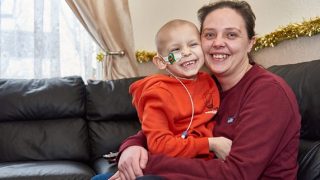
However your child grieves, be patient. Everyone will express their feelings in their own way. Providing ongoing support and understanding throughout their grieving is the best thing you can do. You may not always get it right, and that’s okay. Always remember to look after yourself – take your time and encourage your child to as well.
Read more expert advice
-

What is anticipatory grief?
Anticipatory grief is commonly experienced when you know someone is going to die. You may start to experience feelings associated with grief
Read more -
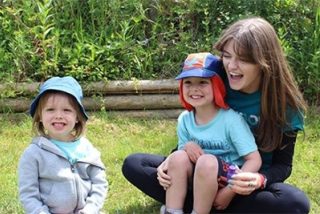
How to support siblings of a seriously ill child
Our article article covers explaining diagnosis and treatment, how siblings might be feeling, and tips on how you can best support them.
Read more -
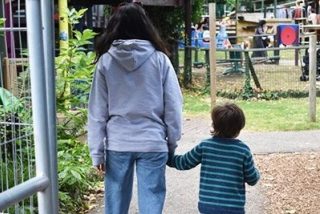
Looking after your mental health when caring for a seriously ill child
Caring for a seriously ill child can be incredibly challenging and emotionally draining. Read our tips for prioritising your mental health.
Read more
How Rainbow Trust supports families
-
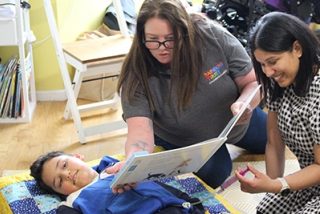
Support for parents
We provide a range of support to parents caring for a child with a serious illness, from diagnosis through treatment and beyond.
Find out more -

Support for young people
We support young people and their siblings who have been diagnosed with any form of life threatening or terminal illness.
Find out more -
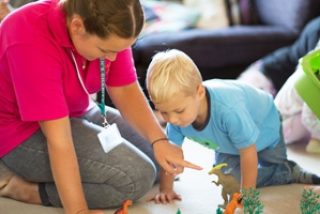
Support for children
Our Family Support Workers do lots of play and arts and crafts with children and their siblings who have a life threatening illness.
Find out more
What Rainbow Trust does
-

Why we help
In England, there are over 86,000 children with life-threatening conditions.
Find out more -

How Rainbow Trust helps
Rainbow Trust pairs each family with an expert Family Support Worker, who provide practical and emotional support.
Find out more -

We support the whole family
We support the whole family including parents, carers, the unwell child, brothers, sisters and grandparents.
Find out more -

How you can support us
By donating to us, you are helping us support families who have a child with a life-threatening or terminal illness.
Donate today

Donate today
Does your family or a someone you know need support with a seriously ill child?
Anyone can refer a family to us (for example, a family member, friend, health, education or social care professional) provided consent from the family has been given for the referral to be made.
